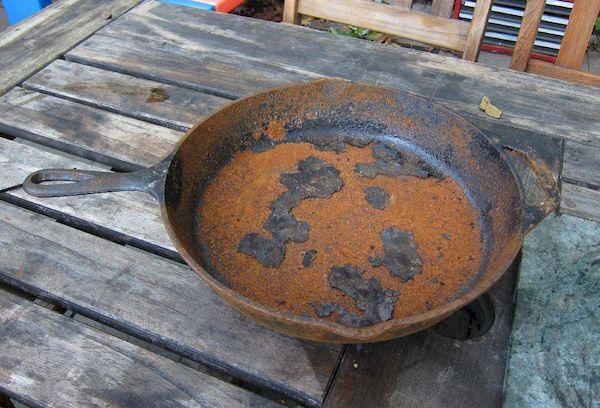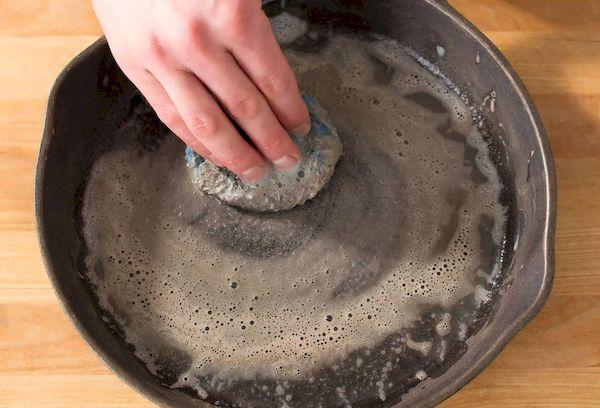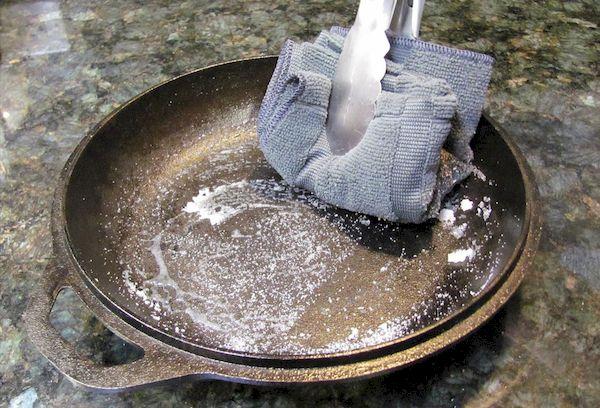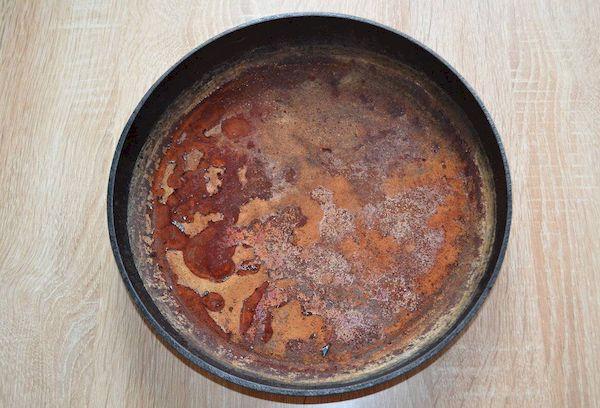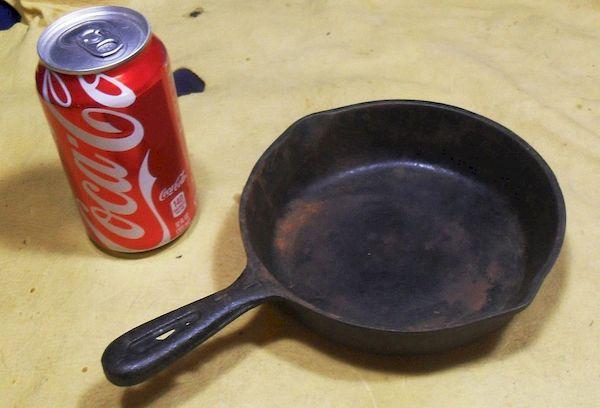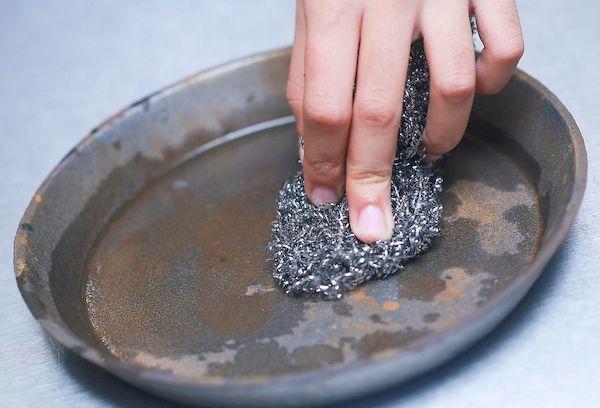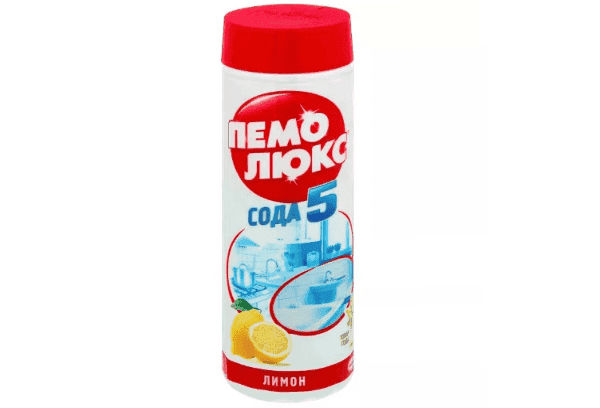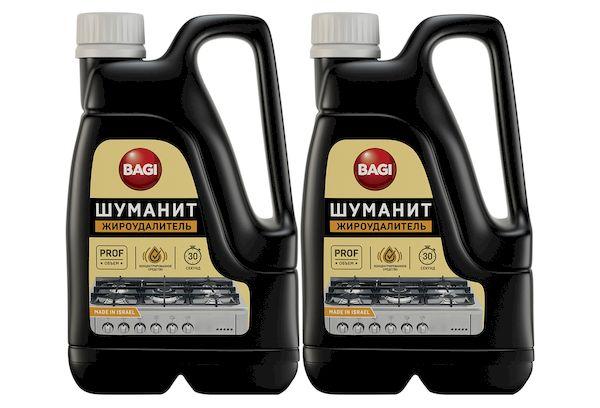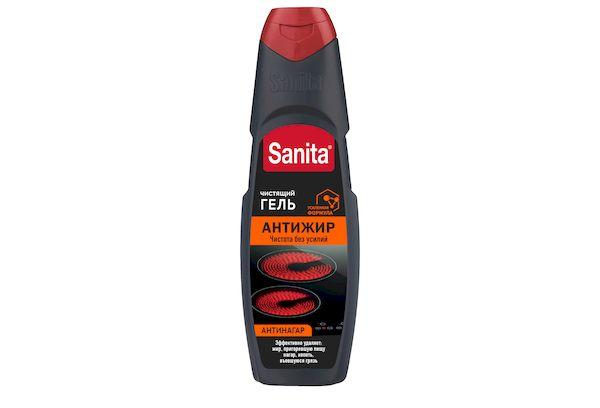How to clean rust from a cast iron frying pan?
Content:
Cast iron cookware is considered almost eternal: it used to be passed down from generation to generation. But if the care is not correct, the question soon arises of how to clean a cast iron frying pan from rust. The task is not difficult if the rusty coating is small and has appeared recently. You can heat the pan, clean it with salt, ammonia, vinegar, soda. Heavily rusty cast iron frying pans can be cleaned mechanically at home - with a drill with a brush attachment, sandpaper, or steel wool. Pemolux and Bagi household chemicals effectively remove rust.
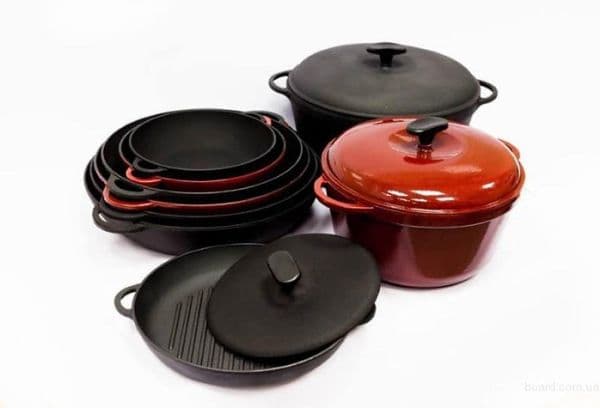
Causes of rust
With proper and regular care, cast iron frying pans do not tend to rust. If your cast iron frying pan is rusty, it means you were doing something wrong. A combination of factors contributes to its appearance:
- food residues were stored in cast iron utensils or were not washed out completely;
- there was water left after washing;
- cleansing with aggressive substances;
- rough mechanical cleaning;
- dishwasher safe;
- long soaking;
- storage in a damp place.
Cast iron is almost pure iron. Unlike stainless steel, it is vulnerable to moisture.
The carbon content is only 2.14% and there are no components that can protect iron from corrosion. If the pan is cleaned white every time, moisture penetrates into the pores. That's why it's so important not to overdo it when cleaning cast iron pans and to oil your cookware from time to time. The procedure allows you to fill the pores of the material, displace moisture, and thereby extend the service life of cast iron. Many people note how rarely old cast iron frying pans, which have been used for many years, rust.
Over the years, cast iron cookware gets better (provided it is used correctly).
It is saturated with oils and fat, food does not burn in it. The non-stick layer prevents rust from forming. If the pan is new, the risk of rust is much higher!
Folk remedies
Don't let the rust on the frying pan scare you. You can return it to its original appearance using improvised means. Table salt, baking soda, and vinegar come to the rescue. Traditional methods are safe. Unlike household chemicals, they do not contain caustic substances.
Baking soda
The folk remedy copes well with small stains and rust stains. Baking soda is used as a cleaning powder. How to clean a frying pan:
- Pour a little dishwashing liquid into clean utensils.
- Pour 2-4 tbsp. l. baking soda.
- Arm yourself with a sponge and rub in circular movements for 3-5 minutes.
- Rinse with warm water.
Salt
A cast iron skillet and coarse salt are best friends. This folk remedy can clean cast iron of any contaminants, including rust. Necessary:
- Fill the pan with coarse table salt almost to the brim.
- Place in the oven, preheated to 220-240 degrees.
- Heat for half an hour.
- Pour out almost all the salt (leave it at the very bottom).
- Scrub the surface with a brush while the pan is still hot.
- Wash.
- Oil it.
Vinegar
Acetic acid helps break down rusty plaque and turn it into powder. To remove rust from a frying pan at home:
- Mix table vinegar in a 1:1 ratio with water.
- Pour the mixture into the frying pan.
- Leave for 2-3 hours.
- Rinse.
- Dry on fire.
Ammonia
If a cast iron frying pan is covered in soot and there are signs of rust, you can clean it to almost new condition with ammonia. This folk method has proven itself well and is considered one of the most effective. Rules must be followed:
- Use a mask when cleaning.
- Open the windows.
- Do not lean over the frying pan.
- Be patient.
You will need 2-3 bottles of ammonia and several thick (necessarily whole!) plastic bags the size of the frying pan.
What to do:
- Pour ammonia into the frying pan.
- Place in a bag.
- Tie tightly.
- Use another package to be safe.
- Leave for 24 hours (the longer the better).
- Untie the bags and scrub the pan with a brush. The smell will be very strong, be careful!
- Rinse in warm water.
After cleaning with ammonia, the pan must be oiled. Flaxseed oil is well suited for these purposes, but you can also use sunflower oil.
Coca Cola
Coca-Cola (and Pepsi too) contains phosphoric acid, which is known to remove rust well. If there is 100-200 ml of liquid left in the jar, you can use it to clean your cast iron frying pan. You should:
- Wash and dry the pan.
- Pour enough Coca-Cola to cover the rust spots.
- Heat over low heat for 10-15 minutes.
- Turn off the heat and wait another quarter of an hour.
- Pour out the remaining drink and wash with detergent.
Calcination in the oven
With prolonged annealing, the rust burns out and falls off. What do we have to do:
- Place a clean cast iron skillet in the oven.
- Turn the temperature to maximum.
- Heat for 4-6 hours.
- After a while (you can the next day) repeat the procedure.
- When there is no trace of rust left, do not forget to “seal” the pores of the pan with fat.
Digestion
This method is used in difficult cases, if rust has appeared on an old cast-iron frying pan or the entire frying pan is covered with a thick rusty layer. You will need a large iron basin or bucket that can easily accommodate kitchen utensils.
- Fill the basin with water.
- Prepare a solution of your choice: 1.5 kg of baking soda per 5 liters of water, 2-3 tbsp. l. table vinegar per 1 liter of water or a grated bar of laundry soap and 15 g of PVA glue.
- Place the frying pan inside and turn on low heat.
- Boil for 2 hours.
- Wash the cooled pan from any remaining rusted solution.
Mechanical methods
Rust stains on a cast iron frying pan can be cleaned off with something tough. Mechanical methods allow you to quickly get rid of small deposits. They will also help to completely remove rust from the entire frying pan - inside and out.
How to remove:
- Using a wire brush or sponge. Wash kitchen utensils with detergent. Rub with a sponge or metal brush. You can sprinkle a little baking soda or cleaning powder for better effect. Wash in soapy water. Restore the oil layer.
- Using sandpaper. You will need paper with medium to fine grain.Put on gloves and sit over a bowl of water. While wetting the paper, clean the pan in a circular motion. Use coarse sandpaper first, then fine sandpaper.
- Using a drill. Install the brush attachment. It should not be too hard, otherwise you will have to additionally sand the pan later. Clean one area at a time until all traces of metal corrosion are gone.
Video:
Household cleaning products
If simple folk remedies don’t help, and for some reason you don’t want to do mechanical cleaning, household cleaning products can help out. There are a wide variety of powders, gels and liquids that contain strong acid or chlorine. They are able to remove rust that is deeply embedded in cast iron. The bad thing is that they are not intended for cleaning dishes and can be harmful to health.
Among the inexpensive and well-known means:
- "Pemolux Soda-5 Extra." Cleaning powder contains soda, mild abrasive and active oxygen. Capable of removing stubborn rust. You need to apply the product to a damp frying pan, rub with a sponge, wait 15 minutes, and then rinse.
- Grease remover "Bagi Schumanit". Contains surfactants, solvents and sodium hydroxide. This popular product effectively removes not only grease and carbon deposits, but also copes with rust deposits. You need to process the pan, leave it for 1 minute, and then wash it in warm water.
- Gel "Sanita Anti-Rust". It is a mixture of acids that are effective against rust. Apply the gel in a thick layer and scrub the pan with a brush. After 10 minutes, rinse off the product.
Attention! When using chemicals, follow the precautions indicated on the packaging. Remove the substance carefully.After cleaning, heat the pan with salt and then with oil.
Preventing rust
Cast iron frying pans are not as capricious as their non-stick counterparts. But they also need care. To prevent rust from appearing, follow the rules:
- After cooking, transfer the food to an enamel or glass container. You cannot store food in a cast iron skillet.
- Clean only by hand. In the dishwasher, the non-stick layer is washed off, making cast iron more vulnerable to rust.
- A very dirty frying pan should be soaked in warm water with the addition of classic dishwashing detergent. Wash it with a cloth.
- Unnecessarily, do not use hard sponges and brushes, avoid abrasive powders and caustic chemicals. The material does not like aggressive influence.
- After any aggressive cleaning, you need to restore the non-stick layer. Grease the frying pan and heat it well. Wash as usual.
- Make sure that there is no water left in the pan. Wipe it after washing with a dry cloth, cloth or towel. You can only store a frying pan that is completely dry.
- Cast iron should be stored in a ventilated and dry place. Do not keep the frying pan near the sink, or where it is damp.
If long-term storage is planned, the frying pan is not used for 2-3 weeks or more, it is recommended to wrap it in oiled paper.
Question answer
Can I use a cast iron frying pan if it is rusty?
You cannot cook food in a rusty frying pan. The oxidized material itself is not toxic, but has a cellular structure and accumulates microorganisms and dust. Rust must be removed before use.
A new cast iron frying pan keeps rusting, what should I do?
It is recommended to regularly use a new cast iron frying pan, following the operating instructions. When used 2-3 times a week, after 2 months it will acquire reliable protection against rust in the form of a non-stick oily film. One of the popular folk remedies is frying lard.
The secret to the longevity of cast iron pans is the protective oil layer. New frying pans are coated with industrial oil to prevent them from rusting in storage. Sometimes, out of ignorance, housewives clean cast iron cookware too diligently. This is where all the problems begin. Fortunately, you can get rid of rust. There are many ways - use household chemicals, folk remedies, or, as a last resort, carry out mechanical cleaning. At the end, the cast iron frying pan must be oiled and henceforth used consciously, taking into account the characteristics of the material.
